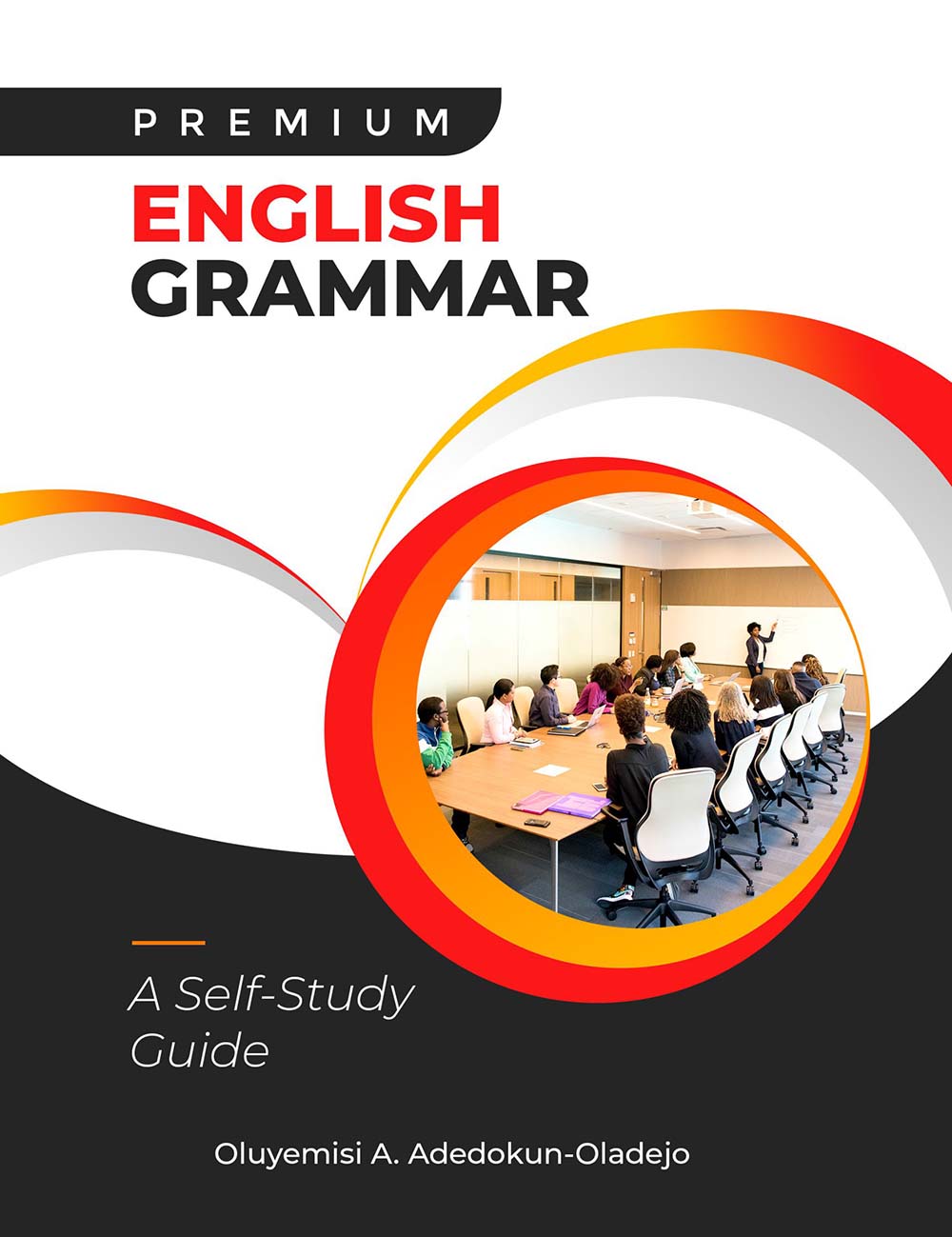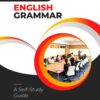Premium English Grammar
₦1,750.00₦2,000.00
- USD: $1.20
As an award-winning writer and teacher who has taught the
language in the classroom and in the virtual space for twelve years to learners
who have aced English certificate examinations, I wrote Premium English
Grammar to help users and learners of English who (like you) are in pursuit of
excellence.
 University Books / Pre-sale Questions
Need Help? Contact Us via WhatsApp
University Books / Pre-sale Questions
Need Help? Contact Us via WhatsApp
This comprehensive grammar guide goes over each grammar-related topic with a fine-tooth comb, rather than scratching the surface. This book is a one-stop source for the grammar needs of many – students and teachers alike. Whether you are a college student struggling with poor grades in English or you are teacher in need of a fool proof textbook for your grammar class, Premium English Grammar is designed to help you achieve your grammar teaching/learning goal.
PRAISE FOR PREMIUM ENGLISH GRAMMAR
PEG is delightfully simple and exhaustive. It is a comprehensive introduction to the English language and the rudiments of teaching and learning it. It is written in an easy-to-read manner.
I wholeheartedly recommend PEG to students and teachers of the English language at all levels. I am confident they will find it an important learning resource that will broaden and deepen their knowledge of the English language.
Funmi Gaji,
Editor, Cactus Global
Communications
******************************
This is a deeply challenging but enormously valuable English Language textbook that could change your life if you do the work. Uncovering the ways in which we should disallow terrible grammar usages may be painful to discover, but ultimately powerful, enlightening and liberating. This exceptional work written by Oluyemisi is truly profound and thoroughly transformational.
Adaobi Udokwu,
Lead Tutor, THC Study Centre (IELTS/TOEFL/GMAT/GRE/IMMIGRATION/TOURS AND TRAVEL)
***********************
Premium English Grammar is a detailed, well analysed and easy-to-read grammar textbook. Each topic treated has achievable objectives, copious examples and a recap. My love for PEG begins right from the Table of Contents. Every page adds to you. This is a highly recommended book for tutors, learners and anyone who desires a premium understanding of the English Language.
EXCERPT 1
EXCERPT 2
What is a Noun?
Consider the sentences below:
① The country’s wealth belongs to the mighty.
② Dancing can make you feel better.
The underlined word (mighty) in Sentence 1 is an adjective; the underlined word (dancing) in Sentence 2 is a verb. But these two words are in those sentences as nouns. Yes, they function
in those sentences as nouns, not as an adjective and a verb. Do you want to verify? Let us attempt substituting them for words that are clearly nouns:
③ The country’s wealth belongs to the president.
④ Drugs can make you feel better.
“President (person)” and “drugs (things)” are irrefutably nouns and we have substituted them for an adjective and a verb respectively. Should we confidently say, “A noun is the name of any person, animal, place or thing” when “dancing (verb)” and “mighty (adjective)” can function as nouns? No, we shouldn’t. The point here is that words from other word classes can function as nouns.
Therefore, we simply define a
noun as a naming word. We can also say, “A noun is a name”.
Here is a tip to help you recognize a noun when you see one. A noun is that element that comes immediately after a determiner, e.g. a thief, the fence, few books.
Recall that we discussed determiners in Chapter 1. It is also important to note that a noun answers the question “who/whom/what/where”.
FEATURES
✔ Parts of Speech
✔ Phrases and Clauses
✔Construction of Sentences
✔Sentence Types
✔The Rules of Concord
✔Direct Speech and Reported
Speech
✔Active and Passive Voice
✔Tenses
✔Question Tag
✔Exercises for Self Assessment
✔Sample Examination Questions
and Answers
ABOUT THE AUTHOR
Oluyemisi A. Adedokun-Oladejo was the winner of the 2020 African Writers Prize for Creative Nonfiction and a co-winner of the Ogun State Academic Laureate . She holds a master’s degree in English from the University of Ibadan. Her experience as a
full-time teacher of English in the classroom and in the virtual space spans 12 years. Oluyemisi has three other publications to her credit. She has facilitated several training programs for educators. She is also an ambassador for several education initiatives including the International Model United Nations, the T4 Global Teachers’ Conference and the Owlypia Global Intellectuals’ Challenge.
Oluyemisi is the lead coach at Premium English Class, an online class for candidates who desire Band 9 in IELTS.
Oluyemisi can be contacted on WhatsApp @ +2348146089500 or on gmail @ premiumenglishclass@gmail.com .
PEEK INTO THE TABLE OF CONTENTS
CHAPTER 1 – Determiners
Objectives
1.1 What are Determiners?
1.2 Categories of Determiners
1.2.1 Articles
1.2.2 Demonstratives
1.2.3 Interrogatives
1.2.4 Possessives
1.2.5 Quantifiers
Evaluation
Recap
CHAPTER 2 – Nouns and Noun Phrases
Objectives
2.1 What is a Noun?
2.2 Classification of Nouns
2.2.1 Common Nouns
2.2.2 Proper Nouns
2.2.3 Collective Noun
2.2.4 Concrete Nouns
2.2.5 Abstract Nouns
2.2.6 Compound Nouns
2.2.7 Nominalized Words
2.3 Nouns and Gender
2.4 Nouns and Cases
2.4.1 The Nominative (Subjective Case)
2.4.2 The Objective Case
2.4.3 The Possessive Case
2.5 Noun Phrase
2.5.1. The Structure of a Noun Phrase
2.5.2 The Functions of the Noun Phrase
2.6. Rules about the Use of Some Nouns
Evaluation
Recap
CHAPTER 3 – Pronouns
Objectives
3.1 What is a Pronoun?
3.2 Types of Pronouns
3.2.1 Personal Pronouns
3.2.2 Reflexive Pronouns
3.2.3 Interrogative Pronouns
3.2.4 Demonstrative Pronouns
3.2.5 Possessive Pronouns
3.2.6 Indefinite Pronouns
3.2.7 Reciprocal Pronouns
3.2.8 Relative Pronouns
3.2.9 Distributive Pronouns
3.3 The Rules Guiding the Use of Some Pronouns Evaluation
Recap
CHAPTER 4 – Adjectives and Adjective Phrases
Objectives
4.1. What is an Adjective?
4.2 Formation of Adjectives
4.3 Types of Adjectives
4.3.1 Adjective of Origin
4.3.2 Adjective of Quality
4.3.3 Adjective of Colour
4.3.4 Adjective of Size
4.3.5 Adjectives of Quantity
4.3.6. Possessive Adjectives
4.3.7 Interrogative Adjectives
4.4. Comparison of Adjectives
4.5. Non-Gradable Adjectives
4.6 Positioning of Adjectives
4.7 Ordering of Adjectives
4.8 Adjective Intensifiers
4.9 Adjective Phrases
4.9.1. The Structure of an Adjective Phrase
4.9.2 The Functions of Adjective Phrases
Evaluation
Recap
CHAPTER 5 – Verbs and Verb Phrases
Objectives
5.1 What is a Verb?
5.2 Classification of Verbs
5.2.1 Lexical Verbs
5.2.2 Auxiliary Verbs
5.3 The Finiteness and Infiniteness of Verbs
5.3.1 To-Infinitive
5.3.2 Gerunds
5.3.3 Participle
5.4 Verbs and Moods
5.4.1 The Indicative Mood
5.4.2 The Subjunctive Mood
5.4.3 The Imperative Mood
Notes on Some Verbs
5.5 Verb Phrases
5.5.1. Finite Verb Phrase
5.5.2 Participial Phrase
5.5.3 Infinitive Phrase
Evaluation
Recap
CHAPTER 6 – Adverbs
Objectives
6.1. What is an Adverb?
6.2. Formation of Adverbs
6.3. Gradation and Comparison of Adverbs
6.4 Adverb Phrases
6.5 Types of Adverbs and Adverb Phrases
6.6. Functions of Adverbs and Adverb Phrases Evaluation
Recap
CHAPTER 7- Prepositions and Prepositional Phrases
Objectives
7.1 What is a Preposition
7.2 Categories of Prepositions
7.3 Prepositional Phrases
7.4 The Rules of Prepositions and Prepositional Phrases
7.5 The Functions of Prepositions and Prepositional Phrases
7.6 The Positions Prepositions
7.7 Types of Prepositions
7.7.1 Notes on Some Prepositions of Place
Evaluation
Recap
CHAPTER 8 – Conjunctions
Objectives
8.1 What is a Conjunction?
8.2 Categories of Conjunctions
8.2.1 Coordinating Conjunction
8.2.2 Subordinating Conjunctions
Evaluation
Recap
CHAPTER 9 – Interjection
Objectives
9.1 Definition
CHAPTER 10 – Clauses
Objectives
10.1 What is a Clause?
10.2 Categories of Clauses
10.2.1 Main Clause
10.2.2 Subordinate Clause
10.3 Elements of a Clause
10.3.1 Subject
10.3.2 Verb
10.3.3 Object
10.3.4 Complements
10.3.5. Adverbials
10.4 Coordination of Clauses
10.5 Subordination of Clauses
10.5 Rankshifting
10.6 Clause Patterns in Examples
10.7 Types of Clauses
10.7.1 Noun Clause
10.7.2 Adjectival Clause
10.7.3 Adverbial Clause
10.7.3.1 Types of Adverbial Clauses
Evaluation
Recap
CHAPTER 11 – The Sentence
Objectives
11.1 What is a Sentence?
11.2 Forms of Sentences
11.2.1 Elliptical Sentence
11.2.2 Unfinished Sentence
11.2.3 Complete Sentence
11.3 Classification of Sentences
11.3.1 Classification of Sentences According to Structure
11.3.2 Classification of Sentences According to Functions Evaluation
Recap
CHAPTER 12 – Tense and Aspect
Objectives
12.1 The Definition of a Tense
12.2 The Definition of an Aspect
12.3 Tenses and Aspects
12.3.1 The Past Tense
12.3.2 The Present Tense
12.3.3 The Future Tense
12.3.4 The Future in the Past
Evaluation
Recap
CHAPTER 13 – Concord
Objective
13.1 What is Concord?
13.2 The Rules of Concord
ii) Notional Concord
iii) Concord of Coordinate Subjects
iv) Double Title Concord
v) Accompaniment Concord
vi) Concord of Indefinite Pronouns
vii) Concord of Proximity
viii) Concord of Pronouns’ Antecedents
ix) Concord Relating to “More Than”
x) Concord Relating to Percentage and Fraction
xi) Concord of Pluratia Tantum
xii) Concord Relating to Time/Distance/Measurement/Money
xiii) Concord Involving “Many a”
xiv) Concord Involving “The Number of/A Number of”
xv) Concord Involving “Here/There”
xvi) Concord Involving “A lot of”
xvii) Concord Involving “A Pair of”
xviii) Concord Involving “Much of/Most of”
xix) Concord Relating to the Titles of Books/Movies
xx) Concord Relating to the Subjunctive Mood
Evaluation
Recap
CHAPTER 14 – Active Voice and Passive Voice Objectives
14.1 The Active Voice
14.2 The Passive Voice
14.3 Formation of the Passive Voice
14.4 The Passive Voice in Tenses
14.4.1 The Passive Voice in the Simple Past Tense
14.4.2 The Passive Voice in the Past Progressive Tense
14.4.3 The Passive Voice in the Past Perfect Tense
14.4.4 The Passive Voice in the Simple Present Tense
14.4.5 The Passive Voice in the Present Progressive Tense
14.4.6 The Passive Voice in the Present Perfect Tense
14.4.7 The Passive Voice in the Simple Future Tense
14.4.8 The Passive Voice in the Future Perfect Tense
14.5 Uses of the Passive Voice
Evaluation
Recap
CHAPTER 15 – Direct Speech and Reported Speech
15.1 What is a Direct Speech? What is a Reported Speech?
15.2 Points to Note When Making Reported Speeches
15.3 Reported Speech and the Different Sentence Types
15.3.1 Reporting a Declarative Sentence
15.3.2 Reporting an Interrogative Sentence
15.3.3 Reporting an Imperative Sentence
15.3.4 Reporting an Exclamatory Sentence
15.4 Mutations of Word Classes and Tenses in Reported Speeches
15.4.1 Verb Changes in Reported Speeches
15.4.2 Pronoun Changes in Reported Speeches
15.4.3 Adverb Changes in Reported Speeches
15.4.4 Tense Changes in Reported Speeches
15.5 Functions of Reported Speeches
Evaluation
Recap
CHAPTER 16 – Formation of Questions
Objectives
Introduction
16.1 Types of Questions
16.1.1 Wh-Questions
16.1.2 Yes/NO Question
16.1.3. Indirect Questions
16.1.4 Negative Questions
16.1.4.1 Uses of Negative Questions
16.1.5 Question Tag 16.1.5 Rules about Question Tag
16.5.2 Contractions to Use in Question Tags
Evaluation
Recap
CHAPTER 17 – Sample Examination Questions





Reviews
There are no reviews yet.